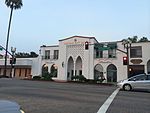Miramar Theatre
1938 establishments in California1992 disestablishments in CaliforniaBuildings and structures in San Clemente, CaliforniaCinemas and movie theaters in Orange County, CaliforniaClifford Balch buildings ... and 3 more
Former cinemas in the United StatesSpanish Colonial Revival architecture in CaliforniaTheatres completed in 1938

The Miramar Theatre is a historic former movie theater and bowling alley in San Clemente, California. Clifford A. Balch designed the building in the Spanish Colonial Revival style and it opened in 1938 as the San Clemente Theatre. The theater closed in 1992 and since has been the subject of various redevelopment and restoration initiatives.
Excerpt from the Wikipedia article Miramar Theatre (License: CC BY-SA 3.0, Authors, Images).Miramar Theatre
North El Camino Real, San Clemente
Geographical coordinates (GPS) Address External links Nearby Places Show on map
Geographical coordinates (GPS)
| Latitude | Longitude |
|---|---|
| N 33.432571440197 ° | E -117.63048299949 ° |
Address
North El Camino Real 1700
92672 San Clemente
California, United States
Open on Google Maps







